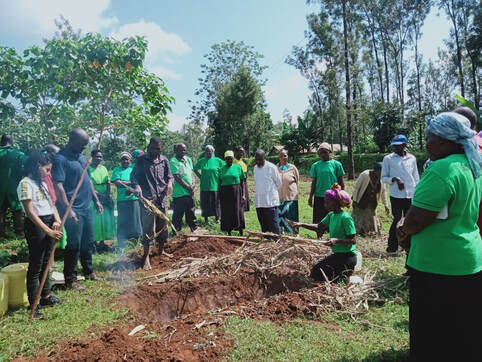Biochar Training
|
Videos – English
|
Videos – ไทย (Thai)
|
Biochar Training and Education
Biochar training for smallholder farmers has become Warm Heart Environment’s number one goal. Over the past 50 years the population in Thailand has increased 146%, from 27.4 million to 67.2 million. 40% of the population are smallholder farmers. who have little to no biochar training in regards to sustainable agriculture practices.
As the population has grown, so has the pollution created by the standard practice of burning crop residue after harvest. The air quality in Thailand has reached high risk levels. It is also a major contributor to global warming.
The process of burning the crop residue in the fields destroys the soils, depleting nutrients and killing off microbes necessary for healthy plant production. Chemical fertilizers and pesticides have been used as a means to improve the soils, which in turn has polluted the groundwater.
Repetitive planting of the same crop also depletes the soils, causing further low yields and poor quality to crop production. Farmers are earning less money.
As the population has grown, so has the pollution created by the standard practice of burning crop residue after harvest. The air quality in Thailand has reached high risk levels. It is also a major contributor to global warming.
The process of burning the crop residue in the fields destroys the soils, depleting nutrients and killing off microbes necessary for healthy plant production. Chemical fertilizers and pesticides have been used as a means to improve the soils, which in turn has polluted the groundwater.
Repetitive planting of the same crop also depletes the soils, causing further low yields and poor quality to crop production. Farmers are earning less money.
History
In October 2015 Warm Heart received a “Breath of Fresh Air” grant from the US Consulate to promote a training and education program to teach local farmers the benefits of biochar technology and sustainable agricultural practices.
Through research and development Warm Heart continues to design and refine biochar pyrolyzer burners that are cheap to build and are accessible to farmers. This is the first step towards eliminating the smoke from open field burning.
We provide biochar training for how to build and use the pyrolyzer burners, along with the benefits of using the end product, biochar, to replace commercial fertilizers, saving the farmers money, and protecting the environment from chemical contamination.
As farmers learn of the benefits of using biochar – increased soil fertility, improved crops, better water retention, they are eager to adopt the new methods.
They are also learning how they can actually make a profit selling the biochar that is created using the pyrolyzer burners. Rather than burn crop residue in open fields, destroying their soil and creating a health hazard, they are seeing that they can turn the process into a lucrative business, one that is both environmentally sound and sustainable.
We provide free biochar trainings to farmers, entrepreneurs, extension agents, government officials and others about biochar, low-tech biochar making technology, sustainable agricultural practices and more. Our materials are available for free download from this site.
Through research and development Warm Heart continues to design and refine biochar pyrolyzer burners that are cheap to build and are accessible to farmers. This is the first step towards eliminating the smoke from open field burning.
We provide biochar training for how to build and use the pyrolyzer burners, along with the benefits of using the end product, biochar, to replace commercial fertilizers, saving the farmers money, and protecting the environment from chemical contamination.
As farmers learn of the benefits of using biochar – increased soil fertility, improved crops, better water retention, they are eager to adopt the new methods.
They are also learning how they can actually make a profit selling the biochar that is created using the pyrolyzer burners. Rather than burn crop residue in open fields, destroying their soil and creating a health hazard, they are seeing that they can turn the process into a lucrative business, one that is both environmentally sound and sustainable.
We provide free biochar trainings to farmers, entrepreneurs, extension agents, government officials and others about biochar, low-tech biochar making technology, sustainable agricultural practices and more. Our materials are available for free download from this site.






